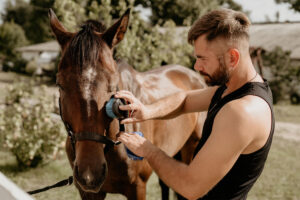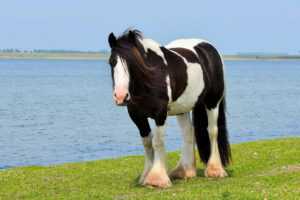
Spring Horse Care: Spring is a beautiful time of the year, with flowers blooming and nature coming alive. It’s also a season when horse owners need to be vigilant about the health and well-being of their equine companions. One of the biggest challenges during spring is dealing with parasites and flies. These tiny nuisances can cause discomfort and health issues for horses if not properly managed. In this article, we will explore effective strategies for combating parasites and flies, ensuring a happy and healthy spring season for your horse.
Understanding Parasites: Parasites are organisms that live off their hosts, relying on them for survival. Horses can be hosts to various types of internal and external parasites, including worms, ticks, and lice. These parasites can cause a range of problems, from mild irritation to serious health complications.
Internal parasites, such as roundworms and tapeworms, can reside in a horse’s digestive system and rob them of essential nutrients. This can lead to weight loss, poor coat condition, and even colic. External parasites like ticks and lice can cause itching, skin infections, and transmit diseases.
Preventing Parasitic Infestations: Prevention is key when it comes to managing parasites. Implementing a comprehensive parasite control program can significantly reduce the risk of infestations. Here are some essential steps to consider:
- Regular Deworming: Consult with your veterinarian to establish a deworming schedule tailored to your horse’s needs. Different parasites require specific medications, so it’s crucial to use the right dewormers at the right time. Rotate deworming products to prevent parasite resistance.
- Pasture Management: Practice good pasture management to minimize parasite exposure. Regularly remove manure from the paddocks and pastures, as it serves as a breeding ground for parasites. Resting pastures periodically and rotating grazing areas can also help break the parasite life cycle.
- Hygiene and Cleanliness: Maintain a clean and sanitary environment for your horse. Regularly clean and disinfect water troughs, feed buckets, and grooming tools. Provide clean bedding in stalls and paddocks, as dirty bedding can attract flies and harbor parasites.
- Quarantine New Horses: When introducing a new horse to your property, isolate them in a separate quarantine area for a few weeks. This allows you to monitor their health and prevent the spread of any potential parasites to other horses.

Fly Control Measures: Flies are not only annoying to horses but also potential carriers of diseases. Implementing effective fly control measures is essential to keep your horse comfortable and healthy. Here are some strategies to consider:
- Stable Management: Keep the stable clean and well-ventilated. Regularly remove manure and soiled bedding, as flies are attracted to these areas. Install fans to improve air circulation and discourage flies from settling.
- Fly Repellents: Use fly repellents on your horse to provide temporary relief from fly bites. Choose a product that is safe for equine use and follow the application instructions carefully. Reapply as needed, particularly before turnout.
- Fly Sheets and Masks: Consider using fly sheets and masks to provide physical protection for your horse. Fly sheets cover the body, while masks shield the face and eyes from irritating flies. Ensure the fit is appropriate and comfortable for your horse.
- Fly Traps and Baits: Set up fly traps and baits around the barn and pasture areas to help reduce the fly population. Various types of traps are available, including sticky traps and baited traps. Follow the manufacturer’s instructions for optimal placement and maintenance.
Conclusion: As spring brings new life and beauty, it also brings challenges for horse owners in the form of parasites and flies. By understanding the risks associated with these nuisances and implementing effective preventive measures, you can ensure your horse’s well-being during this season. Regular deworming, proper pasture management, good hygiene practices, and diligent fly control will go a long way in keeping your horse healthy and happy throughout the spring and beyond. Remember, consult with your veterinarian for personalized advice and guidance regarding your horse’s specific needs. Together, we can make spring a season of joy and optimal equine health.






